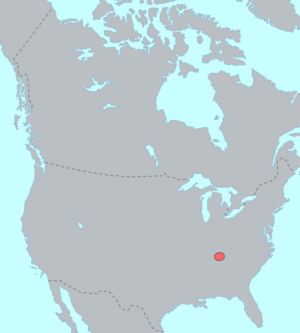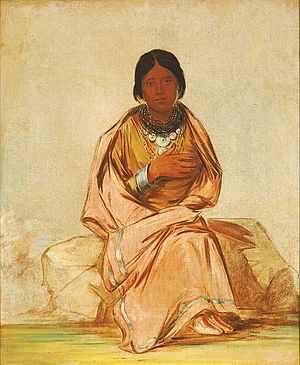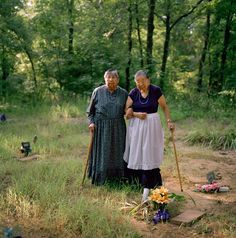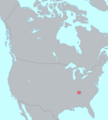Yuchi language facts for kids
Quick facts for kids Yuchi |
||||
|---|---|---|---|---|
| Euchee Tsoyaha |
||||
| Native to | United States | |||
| Region | East central Oklahoma | |||
| Ethnicity | 1,500 Yuchi (2007) | |||
| Native speakers | 4 (2016)e21 12 L2 speakers (2016) |
|||
| Language family |
Language isolate or Macro-Siouan
|
|||

Distribution of Yuchi at the time of European contact
|
||||
|
||||
The Yuchi (also called Euchee) language is spoken by the Tsoyaha (Children of the Sun). These are the Yuchi people, who now live in Oklahoma. Long ago, they lived in the southeastern United States. This area included parts of Tennessee, the Carolinas, Georgia, and Alabama. This was during the time when Europeans first came to America.
Many Yuchi speakers joined the Muscogee Creek people. They moved into Muscogee territory in Georgia and Alabama. In the early 1800s, the Yuchi were forced to move with the Muscogee. They were relocated to an area called Indian Territory, which is now Oklahoma.
Some old audio tape recordings of the Yuchi language still exist. You can find them at the Columbus State University Archives in Columbus, Georgia.
Contents
Understanding the Yuchi Language

The Yuchi language is special because it is a language isolate. This means it is not known to be related to any other language family. Think of it like a unique language that stands all by itself! However, some language experts believe it might be distantly related to the Siouan family. These experts include Edward Sapir and Mary Haas.
In 1997, a group called Euchee United Cultural Historical Educational Efforts (EUCHEE) said there were two main ways Yuchi was spoken. These were called the Duck Creek/Polecat and Bigpond variations. They were used by Yuchi people in those communities in Oklahoma.
Where Yuchi is Spoken Today
Yuchi is mainly spoken in northeastern Oklahoma. The Yuchi people live in areas like Tulsa, Okmulgee, and Creek counties. These areas are part of the Muscogee (Creek) Nation's land.
In 1997, only about 12 to 19 older people spoke the language. This was out of about 1,500 Yuchi people. By 2009, only five people who spoke Yuchi as their first language were left. In 2011, there was only one.
A Look at Yuchi History
Yuchi people lived in Tennessee when Europeans first arrived. In the early 1700s, they moved to northwestern Georgia. They were pressured to move by the powerful Cherokee people in Tennessee. In Georgia, they settled near the Muscogee Creek people and became their allies. In the 1830s, Yuchi speakers were forced to move with the Muscogee people to Indian Territory.
How the Language Changed Over Time
The Yuchi language has changed a lot over the years. This is partly because the people were forced to move. In 1885, a Swiss language expert named Albert S. Gatschet wrote about some unique things in Yuchi. He said that nouns could be made plural by adding a special word.
Later, in 1907, an American expert named Frank G. Speck wrote about Yuchi. He said the language had only one way of speaking it. He also said it did not have true plurals. These ideas were different from what Gatschet had said.
In 1997, the Euchees United Cultural Historical Educational Efforts (E.U.C.H.E.E.) shared new information. They said that two ways of speaking Yuchi exist today. These are linked to the Duckcreek/Polecat and Bigpond areas. This also goes against what Speck said in 1907.
The Yuchi Language Today
Sadly, only a few older people still speak Yuchi. This is because the Yuchi people have become more like the Muscogee and English-speaking cultures.
In 2000, about 15 people could speak Yuchi fluently. This number dropped to 7 by 2006, 5 by 2010, and only 4 by 2013. In 2016, a Yuchi elder named Josephine Wildcat Bigler passed away. She spoke Yuchi as her first language. She worked hard to record and save the language for future generations. Her sister, Maxine Wildcat Barnett, was the last tribal elder to speak fluent Yuchi. She passed away on August 27, 2021.
The Euchee Language Project offers Yuchi classes for free in Sapulpa, Oklahoma. This helps keep the language alive.
The Yuchi people and their language are featured in a book. It's called Spoken Here: Travels Among Threatened Languages (2003). It was written by Canadian author Mark Abley. The book is about endangered languages.
How the Yuchi Language Works
The Yuchi language did not have a standard way of writing until the 1970s. A language expert named James Crawford and a Yuchi person named Addie George created a way to write it down. Yuchi people now use this system to write their language.
Building Words in Yuchi
Yuchi is an agglutinative language. This means words are built by adding small parts (like LEGO bricks!) to a main word. These parts are called morphemes. They can change the meaning of the word. The usual word order in Yuchi sentences is subject–object–verb. This means the person or thing doing the action comes first, then the thing the action is done to, and finally the action itself.
Sounds in Yuchi
The Yuchi language has many sounds. It has 49 different sounds in total. Thirty-eight of these are consonant sounds, and 11 are vowel sounds. This is more than twice the number of sounds in most other Native American languages in the Southeast.
Yuchi has both oral and nasal vowels. Oral vowels are made when air only goes out through your mouth. Nasal vowels are made when air also goes out through your nose.
Stress and Intonation
In Yuchi, how you say a word can change its meaning. This is called stress and intonation. Stress is about which part of a word you say louder. Intonation is about whether your voice goes up or down at the end of a sentence.
For example, the word "What" can mean different things depending on how you say it:
- "What?" (asking for information)
- "What?" (you didn't hear something)
- "What?" (you are surprised or scared)
Yuchi Grammar Basics
Like many Indigenous languages of the Americas, Yuchi grammar builds words by adding parts. These are called prefixes (at the beginning) and suffixes (at the end) to a main word.
Yuchi also has different ways of speaking for men and women. This is called a speech register. Nouns (words for people, places, things) are also grouped in a special way. They are grouped by whether they are alive, if they are Yuchi people, if they are relatives, or by their shape if they are not alive.
Verbs in Yuchi
Yuchi verbs are mostly changed by adding suffixes to the end. In Yuchi, there isn't a big difference between verbs (action words) and adjectives (describing words). So, they often look and act very similar.
Talking About Time (Tense)
Yuchi doesn't always show time (like past, present, future) in the same way English does. Sometimes, it shows how an action happened instead. The past tense is usually shown by adding suffixes to the verb.
- -djin means "ate" (incomplete past)
- -dji'nfwa means "had eaten" (complete past)
- -djinfa' means "used to eat" (habitual past)
There are also two ways to talk about the future. One way is for things that will happen soon. The other is for things that will happen far in the future.
How Actions Are Done (Modality)
Suffixes are also used to show how an action is done.
- -no means "go!" (a command)
- -wo means "should go" (a suggestion)
- -go means "might go" (a possibility)
Nouns in Yuchi
Nouns are grouped into "alive" (animate) and "not alive" (inanimate). This is shown by different suffixes.
- Alive nouns are then split into two groups:
* Yuchi people: These are further divided by family relationships and whether a man or woman is speaking. * Other humans, animals, the sun, and moon.
- Not alive nouns are divided into three groups:
* -fa for things that stand up (vertical) * -e for things that lie flat (horizontal) * -dji for round objects or others that don't fit the first two.
How to Show More Than One (Number)
The idea of "plural" (more than one) is not as strong in Yuchi as in English. But you can make alive nouns plural by adding suffixes. These suffixes are similar to the ones for single nouns.
- -he'no for Yuchi tribe members (when a man speaks)
- -o'no for Yuchi tribe members (when a woman speaks)
- -we'no for all other alive beings
Not alive nouns can be made plural by adding the suffix -ha. This replaces the single noun suffixes.
Pronouns in Yuchi
Pronouns (like "I," "you," "he," "she") in Yuchi are very complex. They are almost always added as suffixes to verbs or nouns. There are many different sets of pronouns.
For example, here are some "Subjective Series" pronouns, which show who is doing the action:
| Subject Series 1 | Subject Series 2 | Independent | |
|---|---|---|---|
| 1st Person Sing. | di- | do- | di |
| 2nd Person Sing. | ne- | yo- | tse |
Third person pronouns (like "he," "she," "they") follow a complex system. This system depends on family relationships and whether a man or woman is speaking. This is similar to how alive nouns are grouped.
When talking about "we" (first person plural), Yuchi has different words. One means "we, including you" and another means "we, but not you."
Reflexive Pronouns
Reflexive pronouns (like "myself," "yourself") are made by combining other pronoun parts. They also follow the same complex rules for family and gendered speech as other pronouns.
Other Word Parts
Instrumental Prefixes
The prefix hi- is used to show what tool or instrument is used for an action. For example, it might be added to a verb to mean "to cut with a knife."
Locative Affixes
Location is very important in Yuchi verbs. These prefixes show where or in what direction the action of the verb is happening. They are a bit like English prepositions (like "in," "on," "under").
- a- means "at a certain place"
- ti- means "inside something"
- f'o- means "inside the earth or under water"
- ta- means "on top of something"
There are also general suffixes that can be used for location:
- -he means "on / at / away from"
- -le means "along / back to"
Making Sentences Negative
You can make a whole sentence negative (say "not") by using one of two prefixes: na- or ha-. Both mean the same thing.
Asking Questions
If a question doesn't start with a question word (like "who" or "what"), you can add the suffix -le to the end of the sentence. If the question is about something that will happen in the future, you use the suffix -yi instead.
Images for kids
See also
 In Spanish: Idioma yuchi para niños
In Spanish: Idioma yuchi para niños
 | Leon Lynch |
 | Milton P. Webster |
 | Ferdinand Smith |



